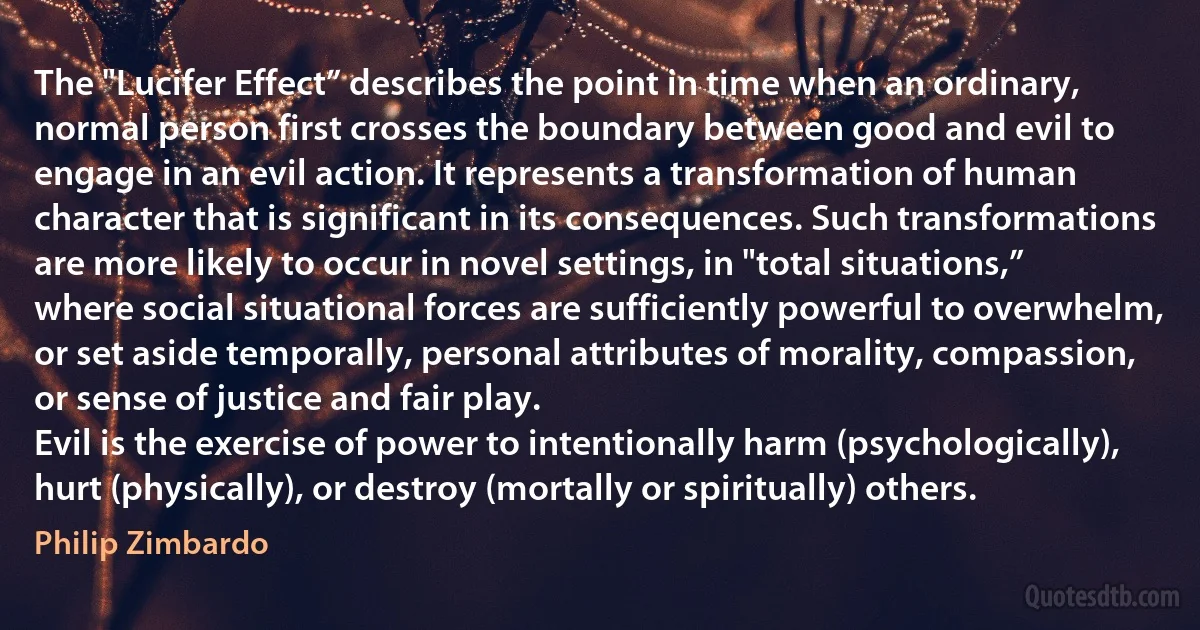
The "Lucifer Effect” describes the point in time when an ordinary, normal person first crosses the boundary between good and evil to engage in an evil action. It represents a transformation of human character that is significant in its consequences. Such transformations are more likely to occur in novel settings, in "total situations,” where social situational forces are sufficiently powerful to overwhelm, or set aside temporally, personal attributes of morality, compassion, or sense of justice and fair play. Evil is the exercise of power to intentionally harm (psychologically), hurt (physically), or destroy (mortally or spiritually) others.
Philip ZimbardoRelated topics
action aside character evil fair good harm human hurt justice likely novel overwhelm person play point power sense set significant time transformation othersRelated quotes
Compassion for other human beings has to extend to the society that's been grinding the powerless under its heel. The more civilized the society becomes, the more humane it becomes; the more it can see its own humanity, the more it sees the ways in which its humanity has been behaving inhumanly. This injustice of the world inspires a rage so intense that to express it fully would require homicidal action; it's self-destructive, destroy-the-world rage. Simply put, I've learned that I must find positive outlets for anger or it will destroy me. I have to try to find a way to channel that anger to the positive, and the highest positive is forgiveness.

Sidney Poitier
Even the victor in a just cause is susceptible to the passions which war arouses. Every inhuman feeling is at once exacerbated. Truth, decency, morality, justice are the first casualties in any war. The accumulated effect makes a just settlement impossible. ... The pacifist treasures justice, liberty; but he believes that they can only be lastingly secured by peaceable means and that the use of force will only contaminate them. ... Armaments themselves provide an independent cause of war owing to the suspicion and fear which they breed. ... Unilateral disarmament offers the only way to escape once the policy of collateral disarmament has failed.

Michael Foot
This art is music. It stands quite apart from all the others. In it we do not recognize the copy, the repetition, of any Idea of the inner nature of the world. Yet it is such a great and exceedingly fine art, its effect on man's innermost nature is so powerful, and it is so completely and profoundly understood by him in his innermost being as an entirely universal language, whose distinctness surpasses even that of the world of perception itself, that in it we certainly have to look for more than that exercitium arithmeticae occultum nescientis se numerare animi [exercise in arithmetic in which the mind does not know it is counting] which Leibniz took it to be.

Arthur Schopenhauer
When a movie is this bad, it's hard to adequately describe its awfulness in words. The temptation exists to write something along the lines of: "Something this horrible has to be seen to be believed." Of course, that kind of advice would lead to e-mail death threats and other assorted nasty comments from those who spend money on The Devil's Rejects. ... Aside from its poor production values, horrendous acting, and ignoble morality, The Devil's Rejects isn't engaging cinema. Even if the simple act of sitting in a movie theater watching people get hacked up for 90 minutes doesn't bother you, the dullness and repetition is likely to.

James Berardinelli
Is there any doubt that drug addiction is an escape from an unbearable inner state - from a reality that one cannot deal with - from an atrophying mind one can never fully destroy? If Apollonian reason were unnatural to man, and Dionysian intuition brought him closer to nature and truth, the apostles of irrationality would not have to resort to drugs. Happy, self-confident men do not seek to get stoned. Drug addiction is the attempt to obliterate one's consciousness, the quest for a deliberately-induced insanity. As such, it is so obscene and evil that any doubt about the moral character of its practitioners is itself an obscenity.

Ayn Rand
